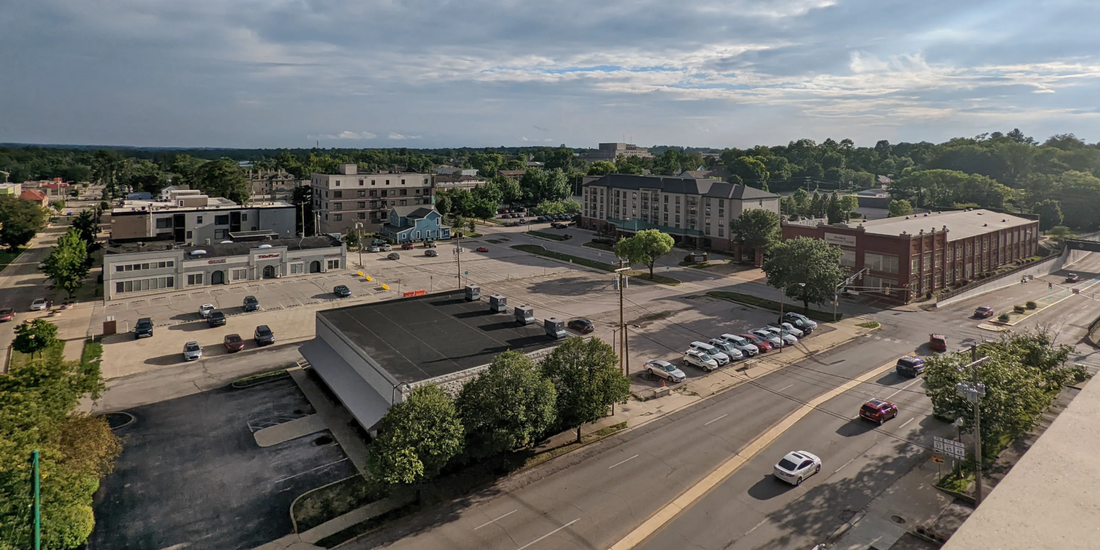|
NOTE: This article that highlights President & CEO, Eric Spoonmore's, involvement was published in the August 5, 2022 B Square Bulletin by Dave Askins. Photos are gathered from the article as well. The initial potential term sheet that has been floated by the city of Bloomington for the acquisition of the Monroe County convention center is now public. The key points of the proposal include the transfer of the convention center at 3rd Street and College Avenue to the city of Bloomington—as well as other property that has been purchased by the county government with proceeds from the innkeeper’s tax. The city wants to acquire the convention center, in order to purse an expansion of the facility independent of the county, because the joint venture between the two governments was stalled even before the COVID-19 pandemic hit. Under the terms, the county would also have to support an annual transfer from the county to Bloomington, or its property manager, the proceeds from the county’s 5-percent innkeeper’s tax. The tax is overseen by a five-member convention and visitors commission, which is appointed by county government. It’s the innkeeper’s tax that is used by the county to make the payments on the existing debt on the convention center. As part of the term sheet, Bloomington would pay off the existing debt, which is about $2.5 million. The only other direct compensation for any real estate would be for property that the county has acquired using “non-convention center-dedicated funds.” That appears to be synonymous with “funds other than innkeeper’s tax revenue.”
Other property that has been acquired by the county for the convention center expansion, like the former NAPA auto parts store at 3rd and Walnut Streets, would simply be transferred to the city, without cash compensation. There are two items among the initially proposed terms that do not appear to have a direct connection to tourism or a related property transfer. Under the terms, Bloomington would transfer to the county health department the city’s share of the statewide opioid settlement, which amounts to a total of about $1.9 million. Under a separate item on the term sheet, Bloomington would agree to operate public bus service outside city limits to Ivy Tech, charging the county the actual extra cost to provide the service. Also included in the term sheet is the county’s retention of receipts from the food and beverage tax that are collected outside the city limits. But that’s already how receipts from the tax have to be distributed under state law. [IC 6-9-41-13] The Friday release of the initial term sheet came after a Wednesday pitch made by Greater Bloomington Chamber of Commerce president Eric Spoonmore and Bloomington deputy mayor Don Griffin to county commissioners. Their pitch came during public commentary at the regular Wednesday meeting of the commissioners. At that meeting, Spoonmore told commissioners he had a spot on next Tuesday’s regular county council meeting. The initial term sheet was included in the information packet released in mid-afternoon on Friday for the county council’s Tuesday meeting. Spoonmore has been conducting a kind of shuttle diplomacy between the county and the city on the convention center expansion. Responding to a B Square question on Friday afternoon, Spoonmore stressed that the initial term sheet is supposed to be just the start of a conversation. “My goal going into this is for everyone to have an open mind—that this is just a starting point,” Spoonmore said. He added, “ Based on my conversations with the city administration, …they’re willing to consider any reasonable response.” County commissioners did not respond on Wednesday, saying they had not been given any details of the proposal. It will be the county council that has the first public venue to discuss the issue. Responding to a B Square question on Friday, county councilor Geoff McKim said, “I support in principle the idea of transferring the convention center to the city. I see the offer that is being made as a good opening to the conversation.” Responding to a B Square question on Friday, county councilor Marty Hawk said she wanted the county legal department to outline the legal steps that would be required for any such deal. Hawk noted that the innkeeper’s tax is enabled under a state statute, and she wants to make sure that no deal the county might strike would wind up being a way to try to circumvent the state statute. [IC 6-9-4] Analysis of initial term sheet Running buses outside the city limits to serve Ivy Tech has long been a topic of conversation. The legal questions that need to be answered are supposed to be included as part of Bloomington Transit’s strategic plan, that is currently being developed. An arrangement to provide public transportation for Bloomington residents who travel just outside city limits to Ivy Tech could be negotiated outside any convention center land deal. The roughly $1.9 million that Bloomington anticipates receiving from the opioid settlements are supposed to be paid out by drug companies over a period of 18 years. In addition, 70 percent of the local government settlement share has to be used for treatment, prevention, and care. A county health department, more than any city government, would be in a better position to expend those funds under the requirements of the settlement. A case could be made that the city should look at transferring its opioid settlement money to the county health department, independent of a convention center deal. Bloomington is proposing to pay off the existing debt on the convention center. But Bloomington would get the receipts from the innkeeper’s tax under the proposed deal. So the idea that Bloomington would pay off the existing debt would follow from the fact that the innkeeper’s tax is the source of funding for the convention center’s existing debt service. So the city’s proposed deal suggests that the city sees the proposed transaction simply as a shift in the governmental stewardship of a tourism facility, which is funded by tourism dollars—not really a real estate deal. That’s consistent with McKim’s commentary: “The county neither pays anything from general funds into the convention center nor takes anything out. It is funded by tourism dollars, which by statute the county controls.”
0 Comments
Leave a Reply. |
Chamber NewsThis blog contains press releases, other news updates from the Chamber, news articles and radio interviews featuring interviews with the Chamber and team members, and much more! Categories
Categories
All
Archives
Archives
July 2024
|
|
Copyright The Greater Bloomington Chamber of Commerce. All Rights Reserved.




 RSS Feed
RSS Feed
